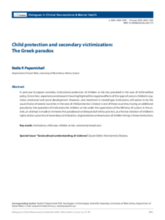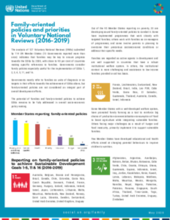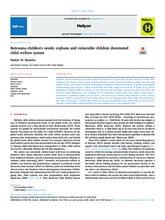Displaying 141 - 150 of 1732
This report reviews specific national and international legal developments for the protection of children in Ireland; examines the scope and application of specific existing or proposed legislative provisions and to make comments/recommendations as appropriate; and reports on specific developments in legislation or litigation in relevant jurisdictions.
The vision of the National Prevention and Response Plan is to foster a society where all children live free of all forms of violence. Its goal is for all children in Kenya to be protected from physical, sexual and emotional violence, and for those children who experience violence to have access to care, support and services. It aims to reduce the prevalence of childhood violence – that is, a child experiencing at least one form of physical, emotional and sexual violence – by 40 per cent by 2024.
In this study, a transdisciplinary group of key stakeholders in Australia jointly constructed a causal loop diagram to bring forth the systemic structure underlying the issue of repeat child removals (where parents lose successive infants and children to out-of-home care) and identify system conditions that need to be altered.
This article illuminates the important role the Committee on the Rights of the Child played in monitoring child abuse and neglect in the implementation of the now thirty years old Convention on the Rights of the Child (CRC).
With a recent interest by stakeholders in Ghana to consider kinship care as an alternative care option in child welfare policy, this study explores current kinship care challenges to help identify and address potential setbacks for policy and practice recommendations.
This article argues that Greece's use of closed-type institutions for child protection is violation of children’s rights and a practice of secondary victimization, stigmatization and exclusion of children living in these institutions.
This paper provides a summary of laws, policies, and programs pertaining to stepfamilies in a selection of Western countries, with a special focus on the United States.
The author argues that early childhood education interventions for OVC should be a priority of government since quality education and care programs in the early years can enhance the possibility of breaking the cycle of inequity in the lives of OVC and positively contribute to the economy of the country.
This analysis of 127 Voluntary National Reviews (VNRs) submitted by 114 UN Member States (13 Governments reported more than once) indicates that families may be key to ensure progress towards the SDGs by 2030, with close to 90 per cent of countries making specific references to families.
This study sought to determine the needs of the general population of children in Botswana.





